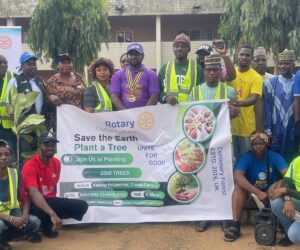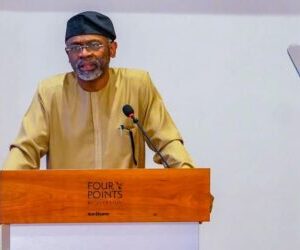Born and raised in India, Prateek Suri trained as an engineer at BITS Pilani in Dubai and grew up in a family that once had plenty but suddenly had very little.
The early experience of gain and loss shaped his drive for enterprise and his instinct for giving.
Through his Maser Foundation, he supports women entrepreneurs, funds children’s education, and partners with hospitals to expand access to healthcare.
In a recent conversation with PREMIUM TIMES, he reflected on how years of building businesses and supporting African communities have reshaped his idea of success.
The 37-year-old said, “I grew up in a family that once had a lot, and then suddenly had very little. That sense of loss shaped me profoundly. My mother often took me to Blind schools in India in my childhood and homes for the underprivileged when I was young. I saw how a single act of kindness could change someone’s day, sometimes even their future. That memory never left me.
“Business builds wealth, but philanthropy builds meaning. At Maser Group, we have always said that growth without impact is incomplete. Our corporate mission includes technology, infrastructure, education, healthcare, and women’s empowerment. Personally, philanthropy grounds me, reminding me why I started this journey.”

Africa
The founder of MDR Investments said he arrived in Africa by fate but decided to devote himself to philanthropic work shaped by his early life experiences.
The engineering graduate added that philanthropy provides balance and fulfilment in his life.
“Africa chose me as much as I chose it. My first steps here were accidental business shipments that found their way to African markets. But what kept me here was not just commerce; it was people. Over time, I realised that success is about building companies and lives.
“That realisation of understanding the meaning of life beyond profit drew me into philanthropy. Orphanages became a natural focus because I strongly believe children deserve not pity, but opportunity.
When you see a child without parents still smiling at the world, you realise how much of a difference a small act of support can make”, Mr Suri noted.
Philanthropy
The businessman stressed that philanthropy is neither a tax dodge nor a public relations stunt but a solemn responsibility.
He explained that transparency, long-term partnerships, and measurable impact guide his foundation’s work.
“I do not believe in charity as handouts; I believe in empowerment, whether that’s through education, healthcare, or skill development. When people see the results on the ground, trust follows naturally. I divide my time between multiple African countries, depending on projects. Nigeria, Zimbabwe, and Zanzibar have been particularly close to my heart.
“My roots are Indian, and they will always anchor me. But Africa has become home. I have embraced its culture, its rhythm, and its people. I don’t see it as a trade-off, carrying India in my heart while Africa has shaped my soul. That’s the reason the Maser Group is headquartered in Africa.”
Mr Suri emphasised that Nigeria represents one of Africa’s beating hearts, noting that its energy, youthful dynamism, and boundless creativity remain unrivalled on the continent.
“Yes, policy, infrastructure, and security challenges exist, but the opportunities far outweigh them. I believe Nigeria will play a central role in Africa’s growth story. Absolutely. Family is central in both cultures. Respect for elders, hospitality, and a community spirit resonate strongly across both societies. That familiarity helped me settle here quickly. I never felt completely foreign.”

Mr Suri stated that while he admired American businessman and philanthropist Bill Gates, Nigerian entrepreneur Aliko Dangote inspired his commitment to philanthropy.
He explained that the 68-year-old embodies African excellence on the global stage.
“Bill Gates inspires me because he proved that philanthropy can be structured and impactful. But my greatest inspiration still comes from my mother, who taught me compassion at a very human level”, said the entrepreneur.
Cultural sensitivity
Speaking on how he maintains cultural sensitivity and respect for traditions in his philanthropic efforts, the businessman said his foundation actively listens to and engages with local leaders, women’s groups, and community elders.
He added that they didn’t approach communities with a “know-it-all” attitude.
Mr Suri added, “Every project is co-created, not imposed. Respecting traditions and understanding sensitivities is not just ethical, it’s the only way philanthropy works in the long run. I see myself as a bridge.
Indian knowledge in technology, manufacturing, and infrastructure can strengthen Africa, while African resilience, creativity, and community spirit can teach India valuable lessons.
“My role is to enable a two-way exchange so both sides win—patience and resilience. Africa has taught me that everything worthwhile takes time. Whether it’s waiting for a harvest or navigating bureaucracy, resilience here is extraordinary. That same patience has made me a better businessman and a calmer human being.”

He noted that his foundation sets metrics such as the number of children educated, women trained, or patients supported.
Furthermore, the entrepreneur stressed that he did not measure himself against other renowned business people or philanthropists, insisting that labels do not define him.
READ ALSO: TikTok, CABC hold Women-in-Media safety roundtables in Lagos, Abuja
Mr Suri added that his ultimate aspiration is to be remembered as an Indian in Africa who left the world a little better than he met it.
“I deeply respect what leaders like Bill Gates have done, but I see myself on my own path. If people draw comparisons, I take it as encouragement. But my focus is not to be the “Indian Bill Gates”. Success is hollow if it only fills your bank account.
“I was searching for something that filled my heart. That “something” was the ability to give others what I once lacked: security, hope, and dignity. Giving back is not just about money; it’s about time, mentorship, and building structures that outlive me,” he said.









